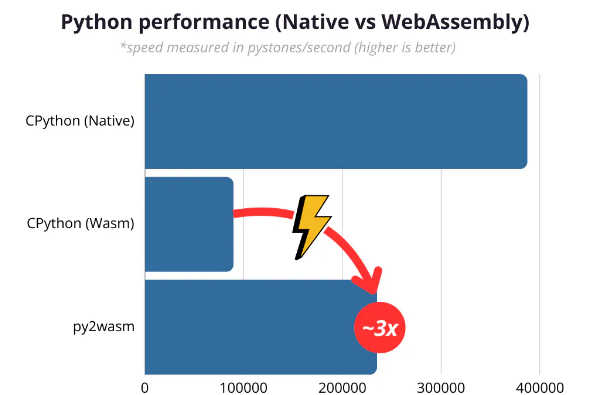| Wasmer's py2wasm Compiles Python To WebAssembly |
| Written by Nikos Vaggalis |
| Thursday, 16 May 2024 |
|
py2wasm is a compiler that turns your Python code into WebAssembly, "running it at 3x faster speeds".
Let's make something clear first. The official announcement from Wasmer states that by turning you program to Webassembly with py2wasm, it runs at "3x faster speeds". What it important to understand is this is in comparison to CPython WASM (CPython interpreter inside of WebAssembly), not native CPython. As such, it is an improvement over the current state of running Python programs in WebAssembly. With that out of the way, lets get into the details. Py2wasm is actually a fork of the Nuitka compiler which compiles Python into C, but adapted to emitting Webassembly instead. The fork, however, exists initially as Wasmer envisions py2wasm as a thin layer over Nuitka. To prove that, they have went to the extend to open a PR on Nuitka's Githubrepo.
Using Nuitka seemed like the easiest option to speed up to Python in WebAssembly contexts, mainly because most of the hard work was already done to transpile Python Code into the underlying CPython interpreter calls, so with just a few tweaks the developers could get it working to compile to WebAssembly. Other options Wasmer examined before they decided to use Nuitka, were
And the winner was Nuitka because Nuitka works, as already mentioned, by transpiling the Python calls that the program makes into C, using the inner CPython API calls. With a few tweaks it has been made to emit WebAssembly executables. This means that you can run Python programs not just inside the browser but also in targets where WebAssembly WASI is supported. As for WASI, it is the WebAssembly System Interface, a modular system interface for WebAssembly (Wasm) that enables developers to run Wasm programs on any platform, including the browser, the cloud, and the edge. WASI is designed to be secure, fast, and portable, allowing developers to write their programs once and run them anywhere. In Wasmer's case the use case is moving their Python Django backend from Google Cloud into Wasmer Edge. Here is how you can use p2wasm : $ pip install py2wasm but after you have installed the Wamer runtime, which you can do on Linux as: curl https://get.wasmer. io -sSfL | sh and on Windows with Powershell as: https://win.wasmer. io -useb | iex Another prerequisite is getting hold of a C compiler. While that is standard on Linux, on Windows Nuitka works with MinGW-w64, MSVC (Visual Studio), and Clang (via Visual Studio). One caveat is that py2wasm needs to run in a Python 3.11 environment and does not (yet) support Python 3.12. With that said, Wasmer are working to make py2wasm available as a Wasmer package in order to make it even easier to use.
More InformationAnnouncing py2wasm: A Python to Wasm compiler Related ArticlesThe WinterJS Javascript Runtime Is Asking For Your Attention
To be informed about new articles on I Programmer, sign up for our weekly newsletter, subscribe to the RSS feed and follow us on Twitter, Facebook or Linkedin.
Comments
or email your comment to: comments@i-programmer.info |
| Last Updated ( Thursday, 16 May 2024 ) |



